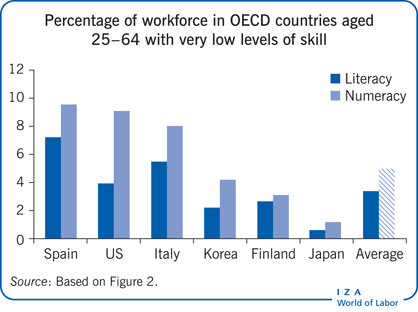Elevator pitch
Even in OECD countries, where an increasing proportion of the workforce has a university degree, the value of basic skills in literacy and numeracy remains high. Indeed, in some countries the return for such skills, in the form of higher wages, is sufficiently large to suggest that they are in high demand and that there is a relative scarcity. Policymakers need robust evidence in order to devise interventions that genuinely improve basic skills, not just of new school leavers entering the market, but also of the existing workforce. This would lead to significant improvements in the population that achieves a minimum level of literacy and numeracy.

Key findings
Pros
In many countries, even relatively low levels of basic skills in numeracy and literacy attract a wage premium.
The wage premium paid to those with better literacy or numeracy varies across countries, reflecting the relative supply of and demand for such skills.
A significant proportion of the workforce does not have sufficiently high levels of skills, so interventions aimed at adults are required.
Children and young people who have parents with higher levels of basic skills also develop higher levels of skills.
Cons
The high wage premium currently paid for basic skills partly reflects a relative scarcity of such skills; if all workers acquired high levels of skills it is not likely they would all earn such a high premium.
In attempting to improve basic skills, undue focus on reading, writing, and mathematics in school can potentially overly narrow the curriculum.
There is limited evidence that improving adults’ basic skills in later life can improve their economic position.